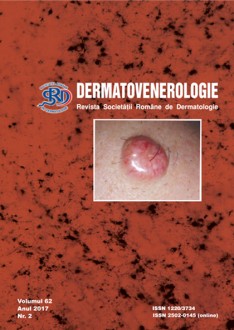Introducere: Psoriazisul este definit ca fiind o boala inflamatorie cronica, cu etiologie mediata imunologic si implicarea factorilor ereditari, cu manifestari cutanate, articulare si rareori mucoase. Acesta afecteaza 2–4% din populatie si poate debuta la orice varsta, avand un varf de incidenta intre 15–25 de ani si 50–60 de ani. Este o afectiune cu evolutie ondulanta, prezentand remisiuni si agravari, avand un profund impact emotional si social asupra pacientilor.
Pacienti si metode: Lucrarea prezinta 2 cazuri de pacienti sub tratament prelungit cu acitretin, in doze de 30mg/zi si respectiv 75-90mg/zi, monitorizati periodic conform protocolului clinicii. Pacientii au prezentat efecte adverse rare, in cazul primului pacient onicoliza indusa de tratament, cat si efecte adverse comune, hiperlipidemia in cazul celui de-al doilea pacient.
Discutii: Tratamentul utilizat in cazul celor 2 pacienti a dus la o imbunatatire atat a aspectului clinic cat si a scorurilor PASI. Cu toate acestea, reactiile adverse aparute pe perioada tratamentului cu acitretin au dus la necesitatea de a reevalua regimul terapeutic, introducerea de medicatie hipolipemianta cat si analizarea unor solutii alternative de tratament.
Concluzii: In acest context, retinoizii pot fi o terapie utila cu conditia monitorizarii permanente a functiilor biologice ale pacientilor. Este recomandabila folosirea de doze mici (25-30mg/zi) pe durate lungi, putandu-se obtine rezultate favorabile cu reactii adverse minime.
Cazuri clinice
CONSIDERATII ASUPRA EFECTELOR ADVERSE ALE TRATAMENTULUI CU RETINOIZI LA PACIENTII CU PSORIAZIS


